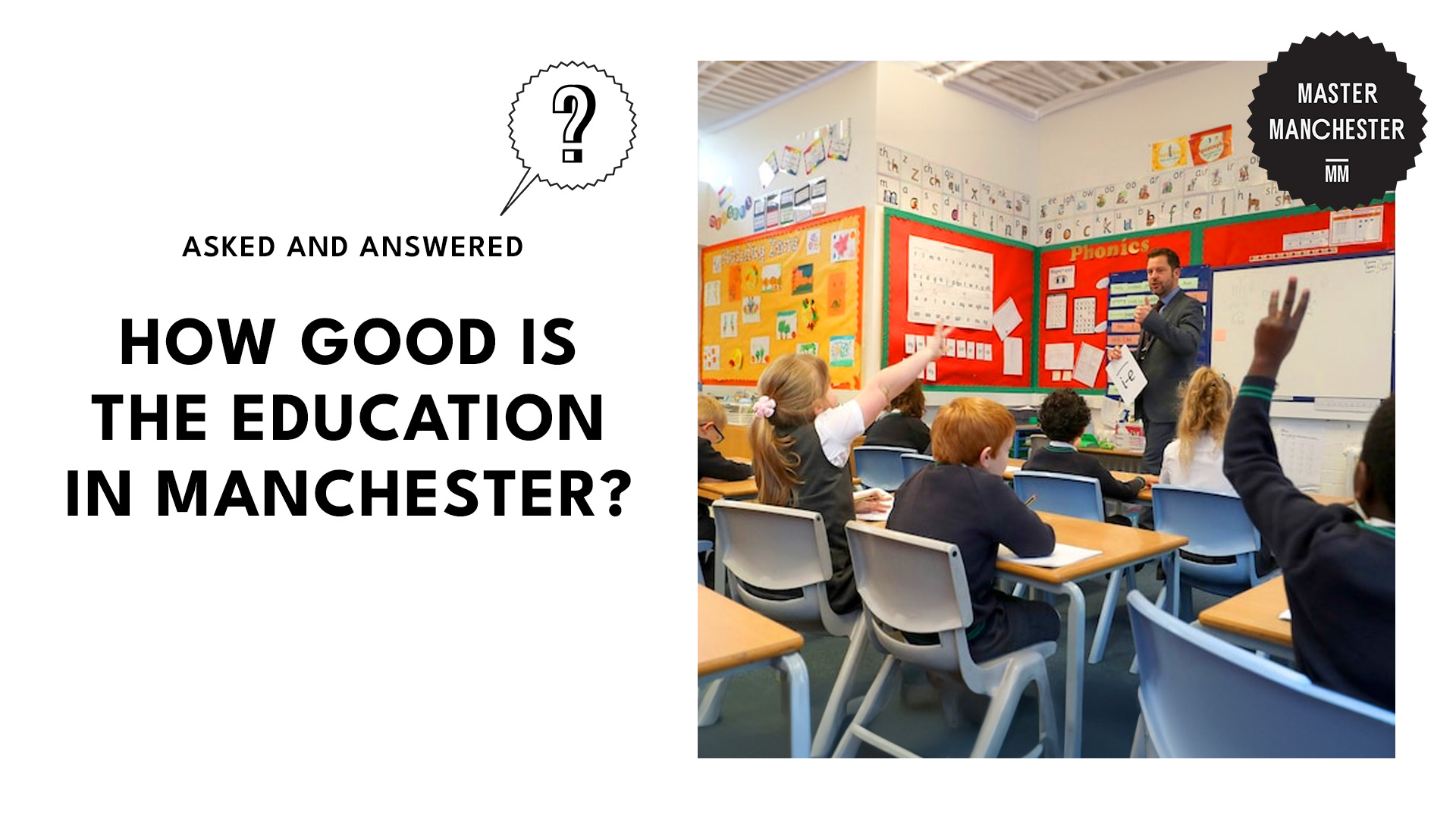Categories > Guides and Tips

Manchester’s Education Breakdown: Uncovering Quality and Standards
- How good is the education in Manchester?
- Overview on Manchester's Education System
- Quality of Primary Education in Manchester
- Quality of Secondary Education in Manchester
- Higher Education in Manchester
- Specialised Education and Vocational Training in Manchester
- Support Services and Special Education in Manchester
- What are the challenges facing Manchester’s education system?
- What are some government policies and initiatives for education in Manchester?
Have you ever looked at your kid and thought, “Wow, they’re growing up so fast”? Then it hits you that they’ll need to make decisions on their own, from which sock to put on to what path to take after school.
And you’re well aware that education plays a pivotal role in shaping their development and skills. From primary schools nurturing young minds to universities moulding future leaders, Manchester has a lot to offer families and students alike.
So, our team has done the groundwork, and we’re here to break down Manchester’s education scene so you can see if it’s the right fit for your child’s future.
How good is the education in Manchester?
Media from withingtongirlsschool
| According to SchoolRun, Manchester’s primary, secondary, and sixth form schools have received “Good” ratings from Ofsted, the Office for Standards in Education, Children’s Services, and Skills. Ofsted inspects and regulates services that provide education and skills for learners of all ages, as well as services that care for children and young people. When a school is rated “Good,” it means the school meets all students’ educational needs and prepares them well for their future. That said, the quality of education in Manchester is highly competitive and reliable, helping students to be well-prepared for their future and careers. |
Generally, the quality of education in Manchester is objectively good, covering everything from primary schools to secondary schools and sixth forms.
Manchester’s efforts have even earned it the title of a UNESCO City of Lifelong Learning. This recognition is a big deal and shows that the city has a strong track record of successful educational practices and policies.
Overview on Manchester’s Education System
Media from mgs_1515
In Manchester, there are public and private schools offering various programs. The city also has prestigious universities and colleges, all focusing on inclusivity and diversity to cater to students from different backgrounds.
And when it comes to higher education, Manchester is top-tier internationally. The universities here attract a diverse crowd of students and faculty from over 150 countries. This diversity not only shows how good the education is but also how connected Manchester is on a global scale.
Quality of Primary Education in Manchester
Media from stbedes_manchester
Primary education in Manchester is where kids start their academic journey, and the city has plenty of primary schools to choose from. Most of Greater Manchester’s primary schools—about 71%—have been rated “Good” by Ofsted, the UK’s Office for Standards in Education.
This means that out of the total, 616 schools are doing a great job. Around 27% of these schools have very high attainment, and 22% have high attainment, though we don’t have data for about 9.85% of schools.

Data retrieved from SchoolRun.
These schools focus on creating a nurturing environment where children can develop essential skills like reading, writing, and arithmetic. They also offer a broad curriculum that includes arts, physical education, and science.
Many of them are community-focused, providing a supportive atmosphere for both students and parents. You’ll find programs like breakfast clubs and after-school activities that offer additional support and enriching experiences beyond the standard curriculum.
One thing to note is that Greater Manchester’s primary schools often have a high ratio of pupils to teachers, which can sometimes be a challenge.
However, these schools work hard to ensure that each child gets the attention and resources they need to thrive, emphasizing the importance of early childhood education.
Quality of Secondary Education in Manchester
Media from manhighgirls
Secondary education in Manchester is pretty strong, with lots of options to fit different learning styles and interests. The city has a mix of comprehensive schools, academies, and grammar schools, each with its own way of doing things and respective costs.
Many of these schools have high-performance ratings, which shows the quality of teaching and good student outcomes.
Most of Greater Manchester’s secondary schools—57%—have been rated “Good” by Ofsted, which amounts to 99 schools. When it comes to attainment, about 19% of secondary schools are rated good, and 18% are rated low, although we don’t have data for about 23% of the schools.

Data retrieved from SchoolRun.
Academies in Manchester often focus on specific areas like science, technology, engineering, math (STEM), the arts, or sports, allowing students to follow their passions while getting a well-rounded education.
In addition, grammar schools, which select students based on academic ability, are known for their tough academic programs and excellent exam results. Comprehensive schools offer education for all students, no matter their ability, and work hard to support each student’s individual learning needs.
Also, extracurricular activities are a big part of secondary education, with schools offering a wide range of clubs and societies, from sports teams to drama clubs, music bands, and debate teams. These activities help students develop important social skills, leadership qualities, and a sense of community.
Another important thing to note is that Greater Manchester’s secondary schools usually have a low ratio of pupils to teachers, which can be a great advantage for providing more personalized attention to students.
Higher Education in Manchester
Media from officialuom
In Manchester, higher education is top-notch and diverse, thanks to institutions like the University of Manchester, Manchester Metropolitan University, and the Royal Northern College of Music. These universities attract students worldwide with their strong academic programs and lively campus life.
For instance, the University of Manchester, is a global leader in research and education. It consistently ranks high in global standings, currently sitting at 34th in the QS World University Rankings 2025. This reflects its dedication to maintaining excellence over the years, even reaching 28th in 2023.
Manchester Metropolitan University is known for its practical approach to learning and strong ties to industry. Graduates often find success quickly due to the university’s focus on real-world skills and experiences.
Meanwhile, the Royal Northern College of Music offers exceptional training for musicians and is recognized globally for its quality education and performance opportunities.
Beyond academics, Manchester offers a vibrant cultural scene and a lower cost of living than other UK cities, making it a great place to study.
Universities here also provide robust support services, from academic advice to career guidance and mental health support, ensuring students have everything they need to thrive.
All in all, Manchester’s universities excel in preparing students for successful careers and enriching their educational journey with diverse opportunities and a supportive environment.
Specialised Education and Vocational Training in Manchester
Media from themcrcollege
Specialised education and vocational training in Manchester offer targeted paths for students aiming to enter specific careers. The city’s colleges provide diverse courses in fields like technology, healthcare, arts, and business.
For example, The Manchester College stands out for its practical approach. They offer apprenticeships and vocational courses that not only teach hands-on skills but also provide real-world work experience. This setup ensures graduates are well-prepared for the job market.
Not to mention, success rates are impressive, too. According to recent surveys by The Manchester College, the majority of graduates move into career paths after completing their studies. Only 3.5% of younger students and 5.7% of adults available for work reported difficulty finding sustained employment.
These numbers highlight how vocational training in Manchester equips students with the skills employers seek. It’s all about bridging education with practical experience, ensuring graduates are ready to thrive in their chosen fields right after graduation.
Manchester’s commitment to specialised education means students have tailored opportunities to succeed in their careers. Whether in technology, healthcare, arts, or business, vocational training here prepares students for rewarding and meaningful employment opportunities in today’s job market.
Support Services and Special Education in Manchester
Media from traffordsendiass
Support services and special education in Manchester are designed to ensure every child with Special Educational Needs (SEN) receives the necessary assistance to thrive academically and socially.
SEN support goes beyond regular classroom support, offering additional or different help tailored to meet each child’s specific needs.
The main goal of SEN support is to help children achieve their learning objectives set by the school. Schools in Manchester actively involve parents in this process to ensure a collaborative approach that supports the child’s development.
Every school in Manchester is required to publish an SEN information report detailing the support provided for SEN students. This report can typically be found on the school’s website.
Parents can also directly approach their child’s teacher or the school’s Special Educational Needs Coordinator for detailed information regarding the specific SEN provisions available.
For families wanting to know about funding for SEN support in mainstream schools, resources like the SENDIASS Manchester Information Resource provide helpful information on how schools get support for kids with SEN.
SEN support in Manchester takes various forms to address individual needs effectively:
- Special programs are designed just for your child to help them learn better.
- Extra help from teachers or support assistants who work one-on-one with your child.
- Adjustments to materials and equipment to make learning easier and more enjoyable.
- Small group sessions where your child gets focused attention and extra help.
- Teachers keep close tabs on your child’s progress, taking notes to track how they’re doing.
- Encouraging your child to get involved in class activities and supporting them when they tackle tough tasks.
- Make sure your child can play and work with other kids at school, building friendships and teamwork skills.
- Helping out with everyday things like eating, moving around safely, using the bathroom, or getting dressed.
All these efforts show how Manchester is committed to making sure every child, no matter their challenges, has the support they need to succeed in school.
By working closely with families and offering a range of support options, Manchester schools create an inclusive environment where every child can thrive and reach their full potential.
What are the challenges facing Manchester’s education system?
Media from stopschoolcuts
Despite its many strengths, Manchester’s education system faces several challenges that impact students, teachers, and overall educational outcomes.
- Overcrowding in schools
As more and more people move to Manchester, schools are having trouble with having too many students in each classroom. This can make it hard for teachers to give each student the attention they need.
When classes are too big, teachers might have to teach in a way that doesn’t work for everyone.
- Funding constraints
Budget cuts and funding limitations are creating big problems for schools in Manchester. These limits are making it hard for schools to decide where to spend money, which affects things like classroom materials and after-school programs.
Important services like counselling and support for students with special needs might also be affected, which could make it harder for students to learn and succeed in school.
- Social and economic differences
In Manchester, students from different backgrounds don’t all have the same success in school. Kids from families with fewer resources can have a harder time doing well in school because they might not have as much support or access to books and school supplies.
This can make it tough for them to do as well in school and have the same chances to go to college.
- Teacher recruitment and retention
Attracting and keeping good teachers is also a big problem. Schools need to offer good pay, chances to learn and grow, and a nice work atmosphere to get and keep great teachers.
But it’s hard for schools to always do this because they don’t always have enough money and teachers have a lot to do.
- Special Education Needs (SEND)
The city of Manchester is dedicated to giving every student, including those with special educational needs and disabilities, the support they need to succeed.
Making sure that all schools have the right resources, well-trained teachers, and good facilities to help students with different needs is really important to them.
What are some government policies and initiatives for education in Manchester?
Media from withingtongirlsschool
To address these challenges, the government and local authorities in Manchester have implemented several initiatives to enhance the quality of education across the city.
- Increased school funding
Superintendent Matthew Geary’s proposal for a $127.5 million budget for the 2024-25 school year has been greenlit by the Board of Education. This significant increase means schools can invest more in smaller class sizes, hiring extra teachers, and improving student support services.
- Special Educational Needs and Disability (SEND) funding
Manchester’s commitment to special educational needs and disabilities (SEND) is evident, with an allocation of £122.847 million from the High Needs Block (HNB).
According to the Schools Budget 2023/24 by Manchester City Council, this includes an extra £8.306 million—a 7.25% increase from last year. Nationally, an additional £0.97 billion is being pumped into the HNB, showing a strong nationwide push to support SEND provisions.
- Additional schools funding
Manchester is receiving £22.250 million from a £2 billion pot of additional school funding, based on a report by Manchester City Council.
This hefty sum, combined with the ongoing Dedicated Schools Grant, will help schools upgrade facilities, expand educational programs, and provide better support for teachers—all aimed at improving student outcomes.
The new funding for schools in Manchester will bring about some great changes. It will help schools to build new classrooms, reduce overcrowding, and provide extra support for students who need it.
Lastly, the extra money will help schools to work more closely with the local community and parents. This means they can offer more activities, work together with local groups, and make sure parents are well-informed about what’s happening at school.





